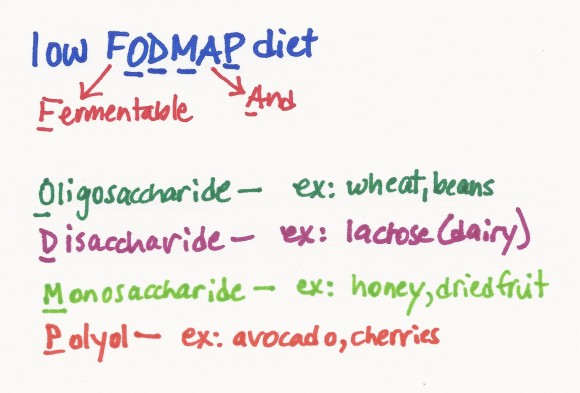FODMAPs
 A few weeks ago, I was asked if I knew anything about the low FODMAP diet as a treatment for inflammatory bowel disease (IBD). I was sure this was yet another fad diet (or that the name was misspelled – seemed like FOD should be FOOD, right?) .
A few weeks ago, I was asked if I knew anything about the low FODMAP diet as a treatment for inflammatory bowel disease (IBD). I was sure this was yet another fad diet (or that the name was misspelled – seemed like FOD should be FOOD, right?) .
Imagine my surprise when I found detailed information about the diet and its use in treating irritable bowel syndrome (IBS) on the Stanford Health Care website. Irritable bowel syndrome is a chronic condition that causes abdominal pain, bloating, gas, diarrhea and other symptoms in the gut. It turns out that FODMAP is an acronym for Fermentable Oligosaccharide, Disaccharide, Monosaccharides and Polyol. All of these substances are found in certain foods and are types of carbohydrates. Researchers in Australia found that these carbohydrates are not well absorbed by the small intestine in people with IBS. As a result, the substances stay in the gut rather than being used by the body and they pull water into the gut. The FODMAPs can also be fermented by the bacteria in the gut which produces gas. All of this can lead to a bloating feeling, pain and other symptoms.
The researchers found that treating people with IBS with a diet low in FODMAPs leads to improvement in symptoms (there is less research about using the diet in IBD which is a more serious condition that causes inflammation and ulceration in the bowel wall).
In a recent article in the NY Times, Jane Brody writes that many people who experience a bad reaction to gluten, are actually reacting to FODMAPs. Unfortunately, the list of foods containing FODMAPs is very long and includes apples, pears, blueberries, tomatoes, bananas, beans, soy milk, broccoli, wheat, honey, dried fruit, lactose, avocado and cherries to name a few.
Trying to stick to a low FODMAP diet might be extremely challenging for most people. And it can take as long as 6 to 8 weeks to see an improvement.
I’m not suggesting that all people with IBS should adopt this diet or that people with IBD (where the research is less conclusive) should give it a try. But it is a consideration for those who are motivated and it may also provide some ideas about foods to look at as possible triggers of symptoms.
More importantly, this is another example of how the food we eat plays a role in health. I’ve written before about the connection between food and inflammation and also about how the food we eat influences the bacteria in our gut (the microbiome). In the case of IBS, many of the symptoms seem to be due to the bacteria in the gut fermenting the FODMAPs in foods leading to the buildup of gas.
It’s a little disturbing that eating “healthy” foods like fruits and vegetables can lead to such severe symptoms in certain people. How do we know which foods to eat?
When I was in medical school I learned almost nothing about nutrition. I’m beginning to think that nutrition may be the most important thing to be teaching in medical school.
One thought on “FODMAPs”